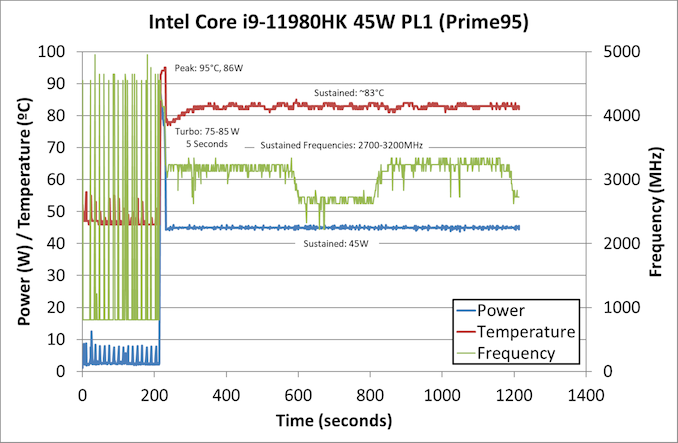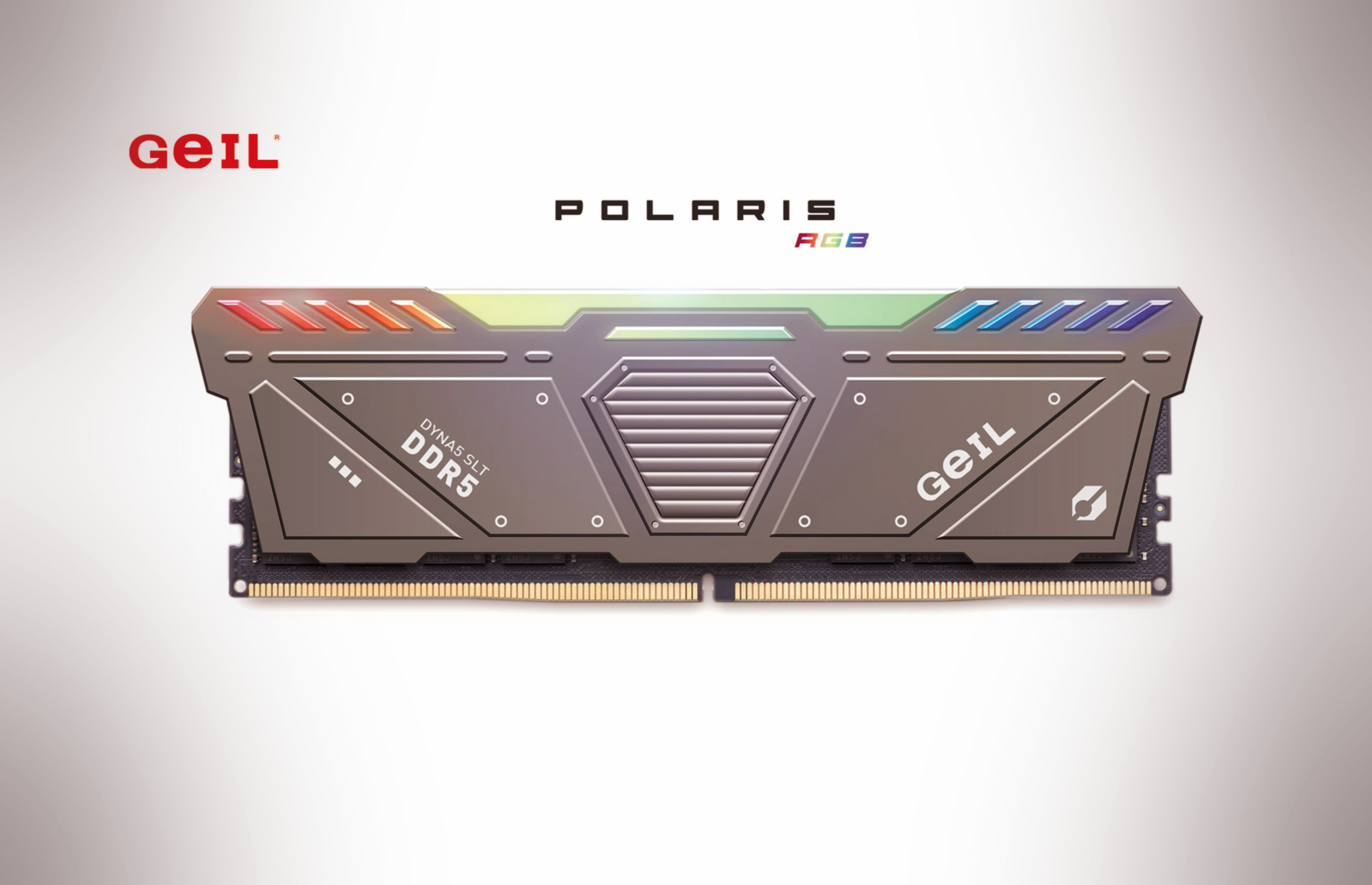coercitiv
Diamond Member
- Jan 24, 2014
- 7,518
- 17,989
- 136
"Normal" may not be the word, but max boost for the 5980HS can go up to 90w!It is a "normal boost". Just because AMD boosts differently to Intel, doesn't mean it's not normal. Intel laptops just have a very different approach to boosting. While AMD slowly try and max out thermal saturation of a chassis over a 5 minute period before mating thermal dissipation of the device afterwards, Tiger Lake-H's base specification of 107W PL2 and 45W PL1 indicates that in that 56s PL2 they hit thermal saturation and then match thermal dissipation afterwards with PL1.

At the start of the test we see the power peak at 62 W for a second or two, before coming down to a 300 second turbo of around 42 W. During this time the frequency comes down to around 3650 MHz, before reducing to 3400 MHz as the turbo budget runs out and the system drops to 35 W for a sustained mode. The second part of the test, which is multi-threaded, starts at around 500 seconds and showcases a sustained temperature of around 81ºC and an opportunistic frequency peaking at 4500 MHz, all while staying at 35 W. Towards the end of the test, as we start looking at single threaded workloads, the system peaks above 60 W on two occasions, but also shows 4500 MHz for ST activity. The CPU temperature rises more to 90ºC as the preferred core is used, but as it is only a single core the thermals are better managed and adjust accordingly.
Um, that's the frequency line, not the power consumption line."Normal" may not be the word, but max boost for the 5980HS can go up to 90w!
View attachment 44493
View attachment 44495

You're right, but look at those frequencies compared to Tiger Lake H. Also, shouldn't the comparison be Mobile vs Mobile for fairness?Um, that's the frequency line, not the power consumption line.
Ironically, the 11980HK - despite all the throttling - is the chip that actually boosts that high with a peak of 86W. Power is in blue and they actually noted peak power at 56W for the 5980HS on the chart.
It literally says Peak: 56W
Yes, frequencies at the same power are higher. We've already established this.You're right, but look at those frequencies compared to Tiger Lake H. Also, shouldn't the comparison be Mobile vs Mobile for fairness?
So you don't think the thermal/power limits and relatively short boost period all could have an impact on the results?Yes, frequencies at the same power are higher. We've already established this.
A theoretical Tiger Lake-S would use the exact same die as Tiger Lake-H. I see no reason why the 5950X would not be a suitable comparison provided it is given JEDEC spec memory to equalise platforms as much as possible. As it just so happens, Anandtech test their desktop platforms using JEDEC spec memory.
If you want to try and compare Willow Cove to Zen 3 in IPC, I don't see why we shouldn't use the full Zen 3 core as a comparison point just as much as the castrated version.
Regarding Zen 3 vs Tiger Lake power draw comparisons based on the new Tiger Lake H review.
Looks like at 65W given adequate cooling Tiger Lake H on 10SF could sustain 3800MHz at 65Watts.
Looking back at the Zen 3 5950X review we see 120 Watts at 3775MHz. So basically 120W vs. 130W for TMSC Zen 3 7nm vs TGL 10SF. Pretty darn close. I believe both of these measurements are package power. TGL also includes iGPU so we could call this even.
You're right, but look at those frequencies compared to Tiger Lake H. Also, shouldn't the comparison be Mobile vs Mobile for fairness?
As @coercitiv mentionned above, not in SPEC as it's a 6 hour long test. a 5 minute +7W increase to power limits provides essentially nothing in terms of performance. And it also shouldn't have an effect on any single thread tasks either, as the 5980HS doesn't require >35W on a single core for maximum single-threaded performance. Not even close to that even.So you don't think the thermal/power limits and relatively short boost period all could have an impact on the results?
Come on, Rocket Lake does not perform "horribly". If tuned properly, it comes very close to Zen 3 in gaming and productivity. If RL performs "horribly", they Zen 3 is only some percent above "horrible". I will grant that performance per watt is very poor, and Zen 3 is clearly a better processor, but RL is a very powerful chip.
I honestly don't understand how much more performance Intel is supposed to squeeze from an aged process on a back-ported design.
So it looks like Rocket Lake's inter-core latency issues aren't just the result of the move to a bigger node. Tiger Lake H is doing better than the 14nm port, but it's still behind Comet Lake.
View attachment 44492
11400H 52.33W 3.52Ghz in R20 11400 77w 3.4Ghz in R20 10SF VS 14FF
That's an extension of the idea that Intel designs aren't somehow locked to a specific node anymore, starting with Sunny Cove. Which, after Rocket Lake, I'm beginning to think is more smoke and mirrors than truth.
No, we didn't rule out anything just yet. However, this review is quite impressive in the amount of detail it is able to provide, and we get information about core latencies for TGL-U and Cezanne as well.Did we completely rule out the possibility that it's not doing some weird power adjustments that affect latencies?
Or, it could simply mean AMD isn't adjusting interconnect speeds while Intel is. We know ring bus speeds are adjusted by Intel nearly every generation.
What the hell is Intel planning with Raptor Lake if it's still on 10nm? Better hybrid changes for improved performance? What does that mean?
It's not like they have much space to grow so they can't add many more cores. Alderlake with GT2 graphics is easily going to get to 250mm2 die size or more. I can't see the cores changing much either.
I feel like Raptor Lake is an improvement to the Atom uArch alongside a Willow Cove style core upgrade (AKA just a cache improvement).
It could just be that too. Idk, we'll have to seeNot sure about this. They put "next" mont as being 2 years after Gracemont. Unless they are *just* adding 2-cycle AVX-512 as with client Core cores.
I don't think it's interesting at all, the die area allocated for 8+8 is equivalent to 10 GC cores. With a 20% IPC advantage and similar clocks the 10 GC chip would obviously match 5900X. The 8+8 not matching 5900X would be a big problem for the first gen desktop hybrid.
Maybe it's time people start comparing 8+8 versus 10+0 of the same kind of cores, and see where exactly you think there's gains to be had for hybrids, because so far all I see is power consumption, which is pure irony considering Intel's attitude in the last few years (squeeze performance no matter the power cost).

The true latency for 6400 Mhz CL32 and 7200 Mhz CL36 kits is 10ns. This is exactly the same as DDR4 3600 CL18 or 3200 Mhz CL16 while providing double the bandwidth (actually more due to DDR5's better design).The GeIL DDR5 memory specification starts at 4800MHz with the sub-timing latencies of CL40-40-40 at 1.1 volts. The overclocking products are also under development, including 6000MHz CL32-36-36, 6400MHz CL32-36-36, 6800MHz CL36-44-44, and 7200MHz CL36-44-44, and will be available with non-RGB product versions at the same time. ]
So AMD does have motherboards with DDR5 support out there for testing with the memory makers. I seriously doubt these are for products released in 2022 H2 (e.g. Zen 4). This to me seems like a hint for Zen 3+.It has been seven years since DDR4 launched into the market, and GeIL has put countless hours into developing the new DDR5 memory modules. And in doing so, GeIL has designed the Polaris RGB to provide RGB illuminated high-performance DDR5 gaming memory and has been working closely with motherboard makers to guarantee the best compatibility and reliability among the latest Intel and AMD motherboards.
I just orderd 64gb of DDR4-4000 because I was anticipating DDR5 ramp to be slow out the gate...now I'm not so sure..@_@
It’s going to be a whacky year in terms of supply. It’ll still be really valuable even if DDR5 is miraculously easily available in all speeds and capacities from the jump. I’d stay the course.


